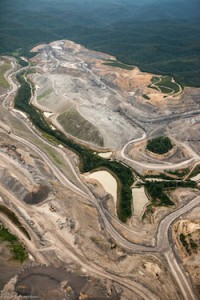This post is by Ben Collins of RAN and Yann Louvel of BankTrack.
The campaign to stop bank financing of mountaintop removal coal mining is gaining momentum.
For years, RAN and other organizations in the global BankTrack network have urged U.S. and European banks to stop financing the devastation caused by mountaintop removal (MTR) coal mining. BankTrack members have worked closely with advocates from Appalachia — the region hardest hit by MTR — including Paul Corbit Brown and Elise Keaton from Keeper of the Mountains, and Bob Kincaid from Coal River Mountain Watch. Together, they’ve travelled around the U.S. and Europe to speak directly to CEOs and boards of banks at their annual shareholder meetings and urge them to stop bankrolling mountaintop removal coal mining.
This week, we have an opportunity to push France’s biggest bank, Crédit Agricole, to stop profiting from MTR once and for all. At today’s annual shareholder meeting, Paul Corbit Brown and staff from Friends of the Earth France urged the bank’s CEO, Jean-Paul Chifflet, to follow the lead of other banks and stop funding the biggest and most destructive MTR companies.
Take action: Now’s the time to back them up — please add your voice now! 
Public pressure to stop funding MTR started showing results a few years ago. U.S. banks were the first to react in 2008, adopting a mix of enhanced due diligence procedures and financing thresholds for companies that engage in mountaintop removal. But real change started to happen last year, when Wells Fargo in the U.S., and Crédit Agricole and BNP Paribas in France, adopted new policies on MTR. These covered both direct project financing of MTR projects — which is pretty rare — and, more importantly, general corporate financing of coal mining companies active in MTR.
The implications of these new policies are potentially huge: the biggest and most harmful producers of MTR coal, such as Alpha Natural Resources and Arch Coal, raise their funding from general corporate loans from banks or from bonds or shares issued to investors. And these are precisely the transactions that should be excluded by these new policies, which bar financing for companies that are “significant” producers of MTR coal.
But we’ve learned that different banks define “significant” in wildly different ways. BNP Paribas blacklists the main companies active in MTR production, including Alpha and Arch. But Crédit Agricole — while its policy looks similar to BNP’s on paper — excludes only those coal mining companies that produce more than 20% of their coal from MTR. In practice, they aren’t prohibited from doing business with any MTR companies at all!
Take action: Will you tell Crédit Agricole Jean-Paul Chifflet to close the bank’s huge MTR loophole?
Crédit Agricole has financed several loan and bond deals for Alpha and Arch — the worst of the worst MTR companies — while BNP Paribas hasn’t done any deals with these two companies since last year. Ironically for Crédit Agricole, financing MTR has not only been bad for the environment and human rights — it’s also been a bad investment. The bank suffered significant financial losses from loans it made to recently-bankrupt MTR miner Trinity Coal.
In contrast to Crédit Agricole, other U.S. and European banks have taken concrete steps away from MTR financing this spring. Last month, JPMorgan Chase published an update of its environmental and social policy framework, stating that they expected to continue defunding companies engaged in mountaintop mining. And in the U.K., Royal Bank of Scotland (RBS) published a mining policy update prohibiting deals with the main MTR producers. Unlike Crédit Agricole’s new policy, these policy changes at JPMorgan Chase and RBS have teeth: both banks will stop financing top MTR producers, including Alpha and Arch.
Today, our allies went straight to Crédit Agricole’s annual shareholder meeting to tell the bank’s CEO and board close its massive MTR loophole, and stop funding Alpha and Arch.
Take action: We have Crédit Agricole’s attention — will you add your voice?
Yann Louvel, Climate and Energy Campaign Coordinator, BankTrack
Ben Collins, Research and Policy Campaigner, Rainforest Action Network